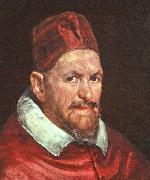Wholesale Oil Painting No Minimum |
|||||||||||
|
|
|||||||||||

|
|||||||||||
|
|
|
||||||||
Diego VelazquezSpanish Baroque Era Painter, 1599-1660 Spanish painter. He was one of the most important European artists of the 17th century, spending his career from 1623 in the service of Philip IV of Spain. His early canvases comprised bodegones and religious paintings, but as a court artist he was largely occupied in executing portraits, while also producing some historical, mythological and further religious works. His painting was deeply affected by the work of Rubens and by Venetian artists, especially Titian, as well as by the experience of two trips (1629-31 and 1649-51) to Italy. Under these joint influences he developed a uniquely personal style characterized by very loose, expressive brushwork. Although he had no immediate followers, he was greatly admired by such later painters as Goya and Manet |
||||||||
|
|
||||||||
Pope Innocent X c
Pope Innocent X c Painting ID:: 62312 |
49,2 x 41,3 cm National Gallery of Art, Washington Perhaps the preeminent Spanish artist of the seventeenth century, Vel?zquez was, from 1623 on, court painter to Philip IV in Madrid. In 1650 Vel?zquez was sent to Italy to buy paintings for one of his monarch's palaces; while in Rome the artist was commissioned to portray the Pope. The final version (now in the Galleria Doria, Rome) was preceded by several small sketches. This canvas was executed probably by someone in his circle. Vel?zquez was given the unenviable task of depicting the most powerful and, according to contemporaries, the ugliest man in Rome. The artist was successful, for when the Pontiff saw the portrait he is said to have remarked, "troppo vero" (all too true!). 49,2 x 41,3 cm National Gallery of Art, Washington Perhaps the preeminent Spanish artist of the seventeenth century, Vel?zquez was, from 1623 on, court painter to Philip IV in Madrid. In 1650 Vel?zquez was sent to Italy to buy paintings for one of his monarch's palaces; while in Rome the artist was commissioned to portray the Pope. The final version (now in the Galleria Doria, Rome) was preceded by several small sketches. This canvas was executed probably by someone in his circle. Vel?zquez was given the unenviable task of depicting the most powerful and, according to contemporaries, the ugliest man in Rome. The artist was successful, for when the Pontiff saw the portrait he is said to have remarked, "troppo vero" (all too true!). |
|||||||
|
CONTACT US |

